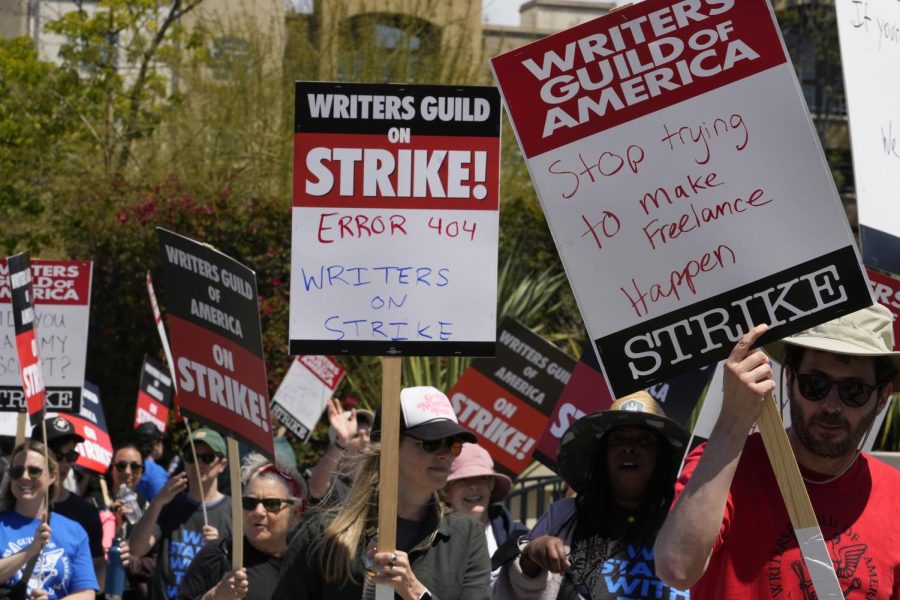Writers Strike delays upcoming shows, movies
Members of the Writers Guild of America (WGA) picket outside CBS Television City in the Fairfax District of Los Angeles on Tuesday, May 2.
May 17, 2023
Pitt alumnus Ben Asciutto, who graduated this April with a film and business degree, said he is concerned about how the WGA strike will affect his career and the industry.
“As someone hoping to transition into a career in late-night [television] later this year, which is completely shut down because of the strike, it is tough to see my short-term goal being possible very soon because the strike does not have an end date,” Ascuitto said.
On May 2, the Writer’s Guild of America officially went on strike after failing to reach an agreement for a new contract with Alliance of Motion Picture and Television Producers, the representative of studios, television networks and streaming platforms such as Paramount, Amazon and ABC. This is the first strike in 15 years for the WGA.
The WGA, consisting of about 11,500 screenwriters, has several demands for the new contract. Writers are negotiating for better compensation, protection against artificial intelligence and mandatory staffing and duration of employment. They argue that streaming culture has changed their working conditions, but their pay is not appropriately adjusted.
“The companies’ behavior has created a gig economy inside a union workforce, and their immovable stance in this negotiation has betrayed a commitment to further devaluing the profession of writing,” WGA released in a statement. “From their refusal to guarantee any level of weekly employment in episodic television, to the creation of a “day rate” in comedy variety, to their stonewalling on free work for screenwriters and on AI for all writers, they have closed the door on their labor force and opened the door to writing as an entirely freelance profession. No such deal could ever be contemplated by this membership.”
Alliance of Motion Picture and Television Producers responded with multiple counterarguments, stating, “These proposals require studios to staff a show with a certain number of writers who will be hired for a specified period of time that may not align with the creative process.”
AMPTP addressed the wage increase proposal in a press release stating that the current wage increase offer is the most offered to the WGA in over 25 years.
AMPTP also said “employment as a writer has almost nothing in common with standard “gigs” jobs.”
A full list of WGA’s demands and AMPTP’s counter offers can be found here.
A prolonged strike could have sustainable consequences if history is any indicator. WGA went on a 100-day strike in 2007 which upended Hollywood and the LA economy.
Asciutto said he understands the importance of writers and supports the strike. During his internship in Los Angeles at HBO last June, Asciutto saw how the industry relies on a myriad of positions to grow.
“There isn’t a clear formula or equation to know what the next hit show or movie will be – it often comes from the inspiring stories of talented writers,” Asciutto said in a message. “I hope the industry realizes the importance of these writers and makes an effort to reassess the pay equities of all union members involved in this business.”
Late night shows such as “Saturday Night Live,” “The Late Show” and “Jimmy Kimmel Live!” felt the effects of the strike immediately when production halted and they began only airing reruns.
On-screen talent such as Drew Barrymore, who was set to host the MTV Movie & TV Awards show, and Mayim Bialik, host of Jeopardy!, have also stepped down to show solidarity.
Movies will feel a slower impact due to long production times — meaning that most of the writing was finished before the strike — but some shows have already confirmed delays.
The creators of Stranger Things, Matt and Ross Duffer, tweeted from the official writers’ room account, “Duffers here. Writing does not stop when filming begins. While we’re excited to start production with our amazing cast and crew, it is not possible during this strike. We hope a fair deal is reached soon so we can all get back to work.”
The final season of animated “Big Mouth,” Marvel film “Blade” and the sixth season of Cobra Kai are among other productions that have halted due to the strike.
Picket lines continue every day in LA and New York City on various film sets in efforts to shut down production. Strikers hold signs reading “Don’t pay us peanuts to write billions,” and “Alexa will not replace us.” Various actors and writers have attended the lines to show their support, including Chris Pine, who brought empanadas, and actress Gina Gershon, who presented a sign that read, “I told ChatGPT to write a sign and it sucked.”
Actors union SAG-AFTRA, and workers union Teamsters both announced their solidarity with WGA. Western Region Vice President of Teamsters, Lindsay Dougherty, tweeted her support, saying, “I’ve been told that the studios are upset about the fact that I’m sticking up for the WGA and telling it like it is. What exactly did you expect when you’re laying off #TEAMSTERS and fucking with my members’ livelihoods and the livelihoods of all industry workers?!”
As the WGA entered week three of strike, the negotiating committee sent a message to its members emphasizing the significant consequences of a prolonged strike. According to Deadline, “The WGA estimates the proposals on the table at contract expiration on May 1 would cost the industry collectively $429 million per year, approximately $343 million of which is attributable to eight of our largest employers.”
The message concludes with a warning to the studios to consider the costs.
“These companies have made billions in profit off writers’ work, and they tell their investors every quarter about the importance of scripted content. Yet they are risking significant continued disruption in the coming weeks and months that would far outweigh the costs of settling,” WGA said in the statement.








